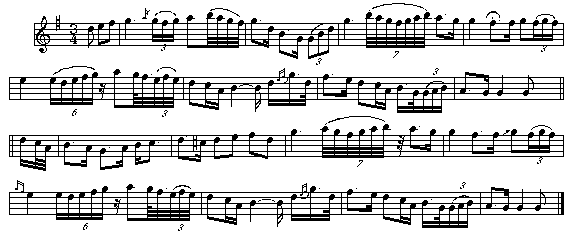

Evidently the lyrics above are not the original as they speak of
a maiden whereas the other text, her lover.
Courtesy of Vivian & Jack. IrishPage.com March 2026.
to pop-up its translation and phonetics.
An bhfaca tú an chúilfhionn 's
í ag siúl ar na bóithre
Maidin gheal drúchta 's gan smúit ar a
bróga?
Is iomaí ógánach súilghlass
ag tnúth lena pósadh
Ach ní bhfaigheann siad mo rúnsa
.....ar an gcuntas is dóigh leo.
Have you seen my fair-haired girl walking the roads?
A bright dewy morning without a smudge on her shoes?
Many a young man is envious and longing to marry her
But they won't get my treasure
.....no matter what they think.
An bhfaca tú mo spéirbhean lá
breá is í ina haonar
A cúl dualach drisleanach go slinneán
síos léi?
Mil ar an ógbhean is rós breá ina
héadan
'S is dóigh le gach spreasán gur
leannán leis féin í.
Have you seen my beautiful woman, a fine day and she is alone?
Her hair curling and twining, hanging down about her shoulders
Sweet young woman with the rosy blush on her brow
And every worthless man hopes she will be his lover.
An bhfaca tú mo bhábán 's í
taobh leis an toinn
Fáinní óir ar a méara
sí ag réiteach a cinn?
'Sé dúirt an Paorach a bhí ina mhaor
ar an loing
Go mb'fhearr leis aige féin í ná
Éire gan roinn.
Have you seen my maid beside the sea
Gold rings on her fingers she is making up her mind?
Mr. Power, who is the master of a ship, said
He would prefer to have her than the whole of Ireland. 
In the twenty-eighth year of the reign of Henry VIII [i.e.,
1536-7], an Act was made respecting the habits, and dress
in general, of the Irish, whereby all persons were restrained
from being shorn or shaven above the ears, or from wearing
Glibbes or Coulins (long locks), on their heads, or hair on
their upper lip, called Crommeal. On this occasion a song
was written by one of our Bards, in which an Irish maiden is
made to give the preference to her dear Coulin (or the youth
with the flowing locks), to all strangers (by which the English
were meant), or those who wore their habits. Of this song
the air alone has reached us, and is universally admired.
Foghraiocht ó Gearóid Ó hAnnaidh as Lucsamburg
Replay background music: The Coolin

Filleadh go indeacs - Return to Song index